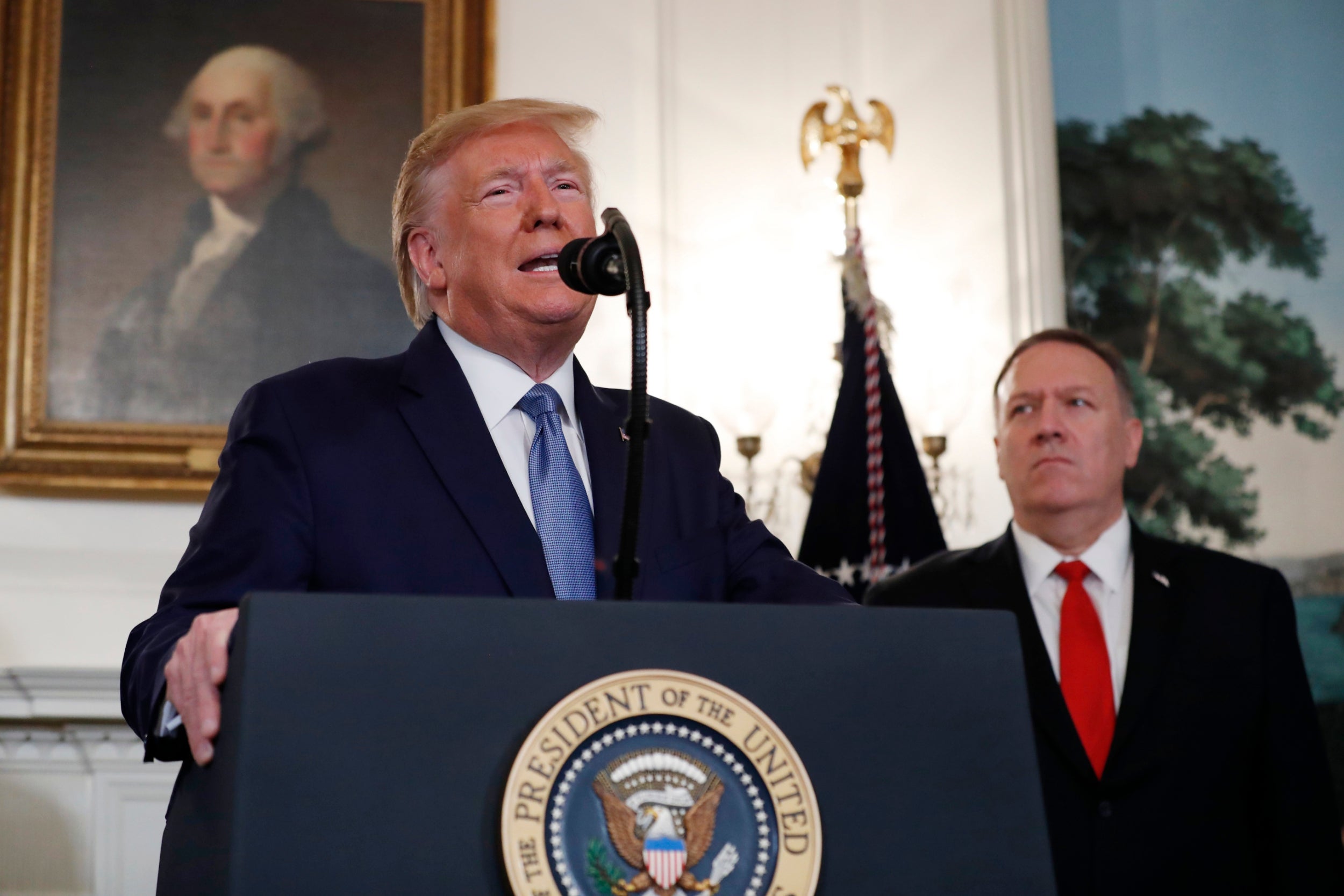Trump's maximum pressure policy on Iran has backfired and experts say it will fail
Iran announces fourth step of withdrawal from nuclear deal, moving further away from limits placed on nuclear programme

It’s been one year-and-a-half since Donald Trump pulled the United States out of the nuclear deal with Iran – calling it the worst deal ever – and embarked on a policy of “maximum pressure”.
Mr Trump has been piling sanctions and heating up the rhetoric against the Islamic Republic.
The US president has said that he aims to negotiate a better agreement with Iran and his policy will bring the Iranians to the table for that new deal.
However, the maximum pressure policy has not yet succeeded in bringing Iran to the negotiating table or curbing its regional activities across the Middle East. In fact maximum pressure seems to have backfired and pushed Iran across the edge.
Iran just announced the fourth phase of its step by step withdrawal from the nuclear deal, moving further away from limits placed on its nuclear program under the JCPOA (Joint Comprehensive Plan Of Action).
After Iran’s announcement, secretary of state Michael Pompeo urged the world to address Iran’s nuclear escalations and take serious steps to increase pressure on the Islamic Republic.
In a public statement, Mr Pompeo said these steps “reflect the regime’s intentions all along: to extort the international community into accepting its violence and terror while it undermines the sovereignty of its neighbours”.
Experts say Iran is left with very few good cards to play in response to Mr Trump’s hardline policy.
“Iranian leaders have calculated that gradual withdrawal from the terms of the JCPOA will force Europe to come to Tehran’s rescue with sanctions relief,” says Nader Hashemi, director of the Centre for Middle East Studies at the University of Denver. “I suspect Macron’s peace initiative has somewhat confirmed this,” he added.
“Iran is playing a high risk game of brinkmanship because the more Iran increases nuclear enrichment, the more the Pompeo/Netanyahu camp and their supporters can claim that Iran must be stopped military,” Mr Hashemi told The Independent.
Despite the Trump administration’s claims, there is little indication that the maximum pressure campaign has worked.
Economically, Iran has been able to draw on some of its financial reserves to cushion off the impact of American sanctions.
“Politically, Iran has been able to utilise the theme of nationalism and exploit historic grievances – that have deep roots in Iranian political culture – about big power bullying to pacify internal opposition (along with increased state-sanctioned repression),” he added.
From an international perspective, the world is more sympathetic to Iran’s position in the nuclear dispute, than the United States. Because Iran stayed strictly committed to the nuclear deal for one year, after the US left the deal and violated its terms.
Experts say it is the Trump administration that started this dispute and is primarily responsible for its non-resolution.
There is also not much admiration for Mr Trump on the international stage – except among right wing authoritarian and neo-fascist groups – and that also helps Iran, Mr Hashemi added.
Harry Reis, director of policy and strategy at the New Israel Fund, said during the debate over the JCPOA that happened in the United States in 2015, it was clear that the Israeli security establishment, including the upper echelons of the IDF as well as its intelligence sector, pretty uniformly diverged from the ostentatiously rejectionist political line of prime minister Benjamin Netanyahu.
“They were telling their US counterparts what every reasonable observer here was forced to confront--that the deal, a result of a multilateral negotiation was a compromise, and presented very real benefits and some risks,” Mr Reis said.
Israel’s security establishment saw the nuclear deal as a way to constrain Iran’s nuclear ambitions for at least a decade. And they saw the JCPOA beneficial to Israel’s security.
Mr Reis said the maximalist approach of the Israeli prime minister led not to strict enforcement of the JCPOA and P5+1 unity, but to a rash unilateral US exit that destabilized this agreement and a “maximum pressure campaign” that has produced only Iranian malfeasance.
The Trump administration’s policy on Iran has isolated the United States and diminished its leverage to enforce the JCPOA, if not open the door to its complete destruction.
The policy of “America First” has always meant America Alone and now we have this dangerous and predictable nuclear misbehaviour enabled by Trump’s failed policy, Mr Reis added.

At the moment, president Trump and his administration are running out of options on Iran. There is not much left to sanction in Iran, and short of military conflict, there is not a lot more pressure that can be applied.
Experts suspect the Trump administration is hoping that Iran’s gradual withdrawal from the nuclear deal will set off alarms across the world, especially in Europe, and help bring more countries on to the American side of this conflict.
“Looking ahead, I think debate should be focused on what the next US president can do resolve this problem,” Mr Hashemi said.
Join our commenting forum
Join thought-provoking conversations, follow other Independent readers and see their replies
Comments
Bookmark popover
Removed from bookmarks